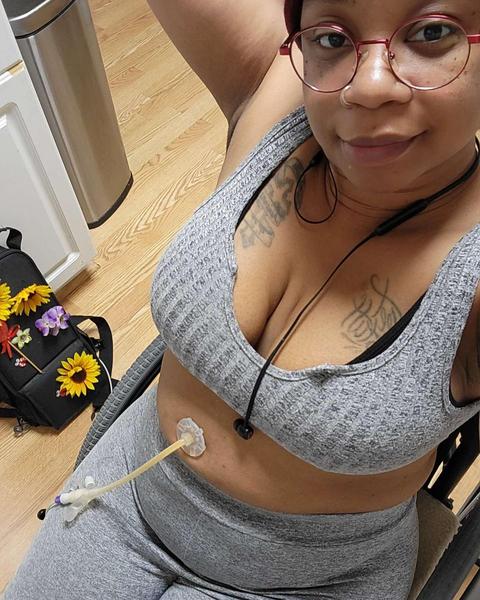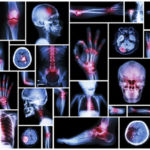For our June newsletter, the Chronic Pain Partners media team interviewed a diverse group of people to highlight the diversity of our community and emphasize the challenges that arise when one belongs to more than one minority. In this interview, journalist Karina Sturm speaks with Adrienne Ferron, an EDS advocate, podcaster, and social media influencer (#LifeofanEDSerwomanofcolor). Ferron talks about the challenges she faces as a woman of color who navigates the American health care system with Ehlers-Danlos syndrome, what she wishes the community would do differently, and her top tips to improve quality of life as a POC with a rare connective tissue disorder.
Karina Sturm:
Hi Adrienne, thanks so much for taking the time to talk to me today! I love your Instagram channel and am glad to have you here to tell me a bit more about your life as a black woman with EDS and what this means in the US. Let’s start with a brief overview of your EDS journey. Can you tell me a bit about when you were diagnosed with EDS and what kind of EDS type you have? What was your journey like?
Adrienne Ferron:
I was diagnosed in December of 2015 with hEDS and vEDS. Before I got diagnosed, I was struggling with a lot of doctors not believing me, telling me I was making it up, or saying, “Well, your lab work looks fine, and you look fine. So I can’t tell that you’re in much pain.” It took a lot to get diagnosed because there were so many doctors that did not want to even examine me. When I was able to find a doctor that finally decided to take a chance on me, she was the one that actually referred me to Emory Genetics and that’s how I was able to get the testing done. Since then, it’s still been a struggle to find doctors that will not only listen to you but also not have such a personal bias about black people.
Sturm:
Tell me what kind of biases you have experienced yourself? How has being a black woman affected your EDS journey?
Ferron:
My journey really was and is bittersweet. I get a lot of people telling me, “Thank you for sharing your story. You’re encouraging.” But then I talked to people in the disability community that don’t feel like a black person should even have EDS. I’ve had people tell me that I couldn’t have EDS because it is only a white person’s disease.
Sturm:
Wait, what? Seriously?
Ferron:
Yeah, I am serious. I was trying to get into a Facebook group to learn more about EDS, and they immediately stopped the process when they saw my picture. They said, “No, our group is not for you. This is only for white people.”
Sturm:
Are you kidding me!?
Ferron:
I’m dead serious. But I’ve had to deal with the fact that many doctors believe the same thing, too. They have said to me, “I’ve never seen this in a black person. You’re the first case I’ve ever seen.” I recently had my feeding tube changed. And I’m still traumatized by this experience because the doctor did not pay attention to my medical notes to understand that my feeding tube was stitched under my skin. So as he’s pulling it out – I’m awake for this procedure – I’m telling him, “Hey, this hurts badly.” I’m crying. And he said to me, “You’re black. You’re not supposed to feel that much pain!”
Sturm:
I am so very sorry this happened to you. Those doctors really should not be doctors at all.
Ferron:
It makes it harder for me to fight for myself being a person of color with this disease because there’s such a stigma behind it. I’ve seen many doctors that did not want to work with me. I’ve had doctors say that I’m combative simply because I’ve been very adamant about certain tests or certain blood work, and I always do my research. I’ve even had a doctor telling me that I know too much, and he didn’t want to work with me. That I’m not wanting to be submissive and just take everything he says by heart. I can’t do that. That’s just not in my DNA. I have to get a second, third or fourth opinion. So it’s been a struggle.
Sturm:
What do you wish that those health care providers would know about people of color with EDS?
Ferron:
First, I would want them to learn how to have bedside manner. This is something that I feel every doctor needs to have; some compassion and class. But the main thing is to listen to the patient of color. They are telling you these symptoms for a reason and they’re coming to you for help. Be mindful of that and be aware that we are all human. We’re going to bleed the same color. So be cognizant of that and stop with all these wrong beliefs, like black people don’t feel pain, black people don’t have certain diseases. None of this is true. I want doctors to be more willing to listen to us. I don’t feel like I’m always heard and that’s the hardest part for me. I’m considered loud and boisterous because I need to be heard.
Sturm:
What do you feel the community should do differently?
Ferron:
I would love it if the community stopped comparing illnesses with each other. That is my biggest issue. It doesn’t matter who hurts more, who hurts less, who has a medical device, or who doesn’t. We are all in this community together. We’re all fighting for our rights. But within the community, there’s so much segregation, there’s so much racism, and there’s so much sexism. We are supposed to be here to support each other and have support from other allies. I think everything would go more smoothly if we could make our voices heard unanimously – not just “the disabled black group has this issue” or “this white disabled group has those issues.” No, we need to be all in one accord, no matter what our disability is. And there’s no need to compare. That is something that I wish didn’t happen in our community. We’re all one.
Sturm:
Yeah, I couldn’t agree more. I hate this whole competition, and I’m always wondering why we do this? You can’t even compare two people with the same EDS type because we all feel differently. As a woman of color, what is the most challenging part about EDS and healthcare?
Ferron:
In terms of healthcare, I’m going to specifically talk about insurance. I have struggled with insurance. I’m actually in a fight for an appeal right now because they did not tell me that every year I have to have my doctor send over a letter of necessity stating why I need the formula [for the feeding tube], why I need the medical supplies. So right now, I have to pay this out of pocket. We live in a one-income family home. That’s hard to do when you only have one person working, and you have to rely on that. And I can’t get disability because I am married, and my husband makes over 50K. So they say, “Oh, he can handle it.” And that’s not true. And as far as the government, I want them to understand that disabled lives matter, too. We’re not meant to be sitting in the backroom of a home, and nobody knows who we are. That happens a lot with disability, especially within the black community. We tend to hide our disability because we’re so embarrassed; because the world has told us that we should be embarrassed about it.
Sturm:
Why is that?
Ferron:
It’s black culture. Here, you’re told that whatever happens in your house stays in your house. If Uncle Earl is an amputee and he can’t walk anymore, nobody needs to know that. Uncle Earl just needs to sit in the back room and watch wrestling all day, and we’ll just bring him food like he’s in jail. We as black people have to stop with that stigma of hiding what’s going on within our homes because how are we supposed to get help if we’re sitting here hiding?
Sturm:
Yeah, I understand. I struggled to find a more diverse community to talk to, especially men. Do you think this culture of not talking about illness is one reason?
Ferron:
I do. It’s interesting you said that because I just started a TikTok, and I’ve had black women and men responding, “Hey, thank you for normalizing this, but I’m still scared to share my story.” Many people are scared to share their stories because of whatever repercussions might come from it. Either their family is going to get upset because now you told our business, or people in your neighborhood have already suspected it, and now they’re looking at you differently. Being black and being a woman is dangerous in the States because just as the police are killing black men, the doctors are not taking care of black women very well. In the state that I’m in, Georgia, we have the highest black mortality rate when it comes to mothers either losing their life during birth or mother and baby losing their life. And we are not believed because we’re told black people don’t feel that much pain or our skin is really tough. I had nurses tell me my skin is really tough; it’s harder than white people’s, so they have to press a little harder.
Sturm:
Oh crap. I can’t say much besides I’m sorry. This sounds incredibly tough.
Ferron:
Girl, the things that you would hear here in the States! It’s not safe for us here. There is so much racism everywhere.
Sturm:
Have you heard of the film The Deadliest Disease of America?
Ferron:
No.
Sturm:
It’s a documentary about precisely those things you just talked about. Racism in medicine, gender bias, particularly towards women of color, and the lack of black women in medicine.
Ferron:
I would love to watch that. And that also motivates me to do a documentary on my life. Because any time you look up EDS, anytime you go on YouTube, all you see is white people. You don’t see no one of color. It feels like my life is in danger when I go to ER because that’s where I have the biggest struggle with doctors. The ER doctors are just like, “Your lab work looks fine. You should be good. We don’t know why you’re in pain.” And they send you off on your way. I want this to stop. So maybe I need to tell my own story to educate them.
Sturm:
Out of curiosity, where do you live? Because I might actually do some more EDS short films, and I would love to tell your story as well.
Ferron:
I’m in Atlanta, Georgia.
Sturm:
I’d love to keep in touch with you and see if we can realize a project together in the future. When I did my first documentary, I wasn’t super well connected within the community and had a hard time finding a more diverse community to film, but these days, things are different, and I am focusing on intersectionality, meaning LGBTQ, ethnic minorities and generally marginalized communities.
Ferron:
Yeah, that would be really cool because I’m also part of the LGBTQ community. And you know what? I’ve never had an issue when it comes to the disabled LGBT community. They’ve always been accepting with open arms. I wish all of the disability community could do that.
Sturm:
Oh, amazing! I wasn’t aware of that fact. Thanks for sharing! Do you have any good advice for other zebras of color? What should they know or do?
Ferron:
Learn how to advocate for yourself. That is number one. Number two, understand your HIPAA laws. You got to read those pamphlets that they give you at the ER. Those are there to protect you. Three, understand what an advanced directory is. Basically, you are spelling out what you want to happen in case you cannot respond for yourself due to medical emergencies. Fourth: understanding what palliative care and hospice are because people get those confused, too. I am in palliative care, and most people, when I say that, automatically think of hospice.
Sturm:
Yeah, that’s true. I got those confused when I moved to the US as well. In Germany, palliative care is usually end-of-life care. So when my doctor brought up palliative care, I was like, “Wait, what? Am I dying?”
Ferron:
Yeah.
Sturm:
Is there anything important you’d like to highlight at the end of this interview?
Ferron:
I’d like to stress that we are all one in this disability community. Let’s not compare what we have and just learn to love and grow with each other. I feel like that is going to be what makes us better people, and it doesn’t matter what the name of the disability is. Every person can have a disability. Be mindful of that, and have more compassion for those that are disabled. We are trying to live our best life just like you are. So don’t judge us and how we’re living.
Sturm:
Thanks for this very great ending. Adrienne, I am so glad we finally got to speak, and I hope we will do this again soon.
Ferron:
Thanks, Karina! Talk soon!



